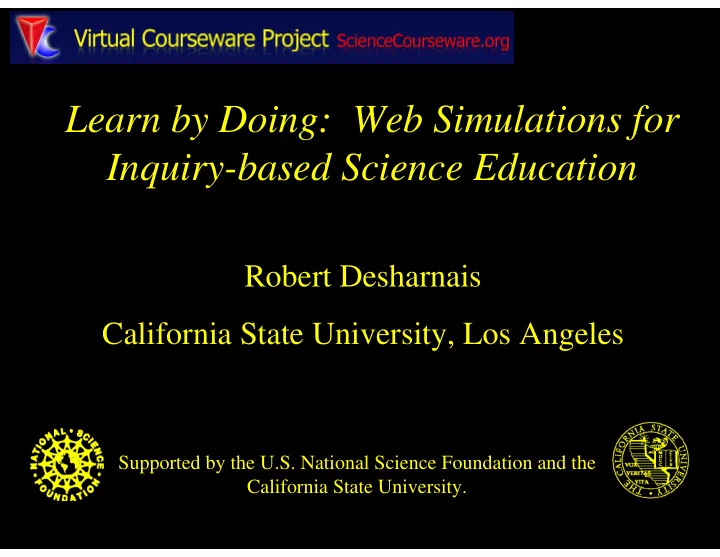

Learn by Doing: Web Simulations for Inquiry-based Science Education Robert Desharnais California State University, Los Angeles Supported by the U.S. National Science Foundation and the California State University.
Virtual Courseware Project Philosophy Students Learn by Doing! “Virtual Courseware” activities are interactive simulations that emphasize the scientific method: making observations, proposing hypotheses, designing experiments, collecting and analyzing data, synthesizing results.
Virtual Courseware Development and Usage Activity or Suite Time Period No. Users 7/95 – 8/00 665,000 Virtual FlyLab 9/96 – present 3,632,000 Virtual Earthquake Biology Labs On-Line: CardioLab, DemographyLab, EnzymeLab, 9/99 – present 827,000 EvolutionLab, FlyLab, HemoglobinLab, LeafLab, MitochondriaLab, PedigreeLab, PopGenLab, PopEcoLab, TranslationLab Geology Labs On-Line: Virtual Dating – Isochron, Virtual 9/99 – present 548,000 Dating – Radiocarbon, Virtual River – Discharge, Virtual River – Flooding Earth and Environmental Science Courseware: Earthquake ; 9/01 – present 559,000 Global Warming – Energy Balance, Future Climate Change Virtual Courseware for Inquiry-based Science Education: 1/09 – present 262,000 Drosophila, Natural Selection, Relative Dating Total 6,493,000
Users of Virtual Courseware Earthquake Activity Elementary Schools Colleges and Middle 1% Universities Schools 25% 25% High Schools 49%
Technologies Utilized Activity or Suite Technologies Virtual FlyLab Web page forms and CGI scripts Virtual Earthquake Web page forms and CGI scripts Biology Labs On-Line Java with scripts for HTML export Geology Labs On-Line Java, Flash, CGI scripts Earth and Environmental Science Java, Flash, PHP, MySQL for Courseware accounts & assessment Virtual Courseware for Inquiry- Flash, PHP, MySQL for accounts & based Science Education assessment
ScienceCourseware.org
Conclusion Virtual Courseware: • provides opportunities for inquiry-based learning. • can be used for activities too expensive, too dangerous, too time-consuming, or impractical for traditional hands-on instruction. • provides convenient opportunities for out-of-class and out-of-lab learning. • is an inexpensive method of inquiry-based learning. • allows efficient assessment of learning.
Recommend
More recommend